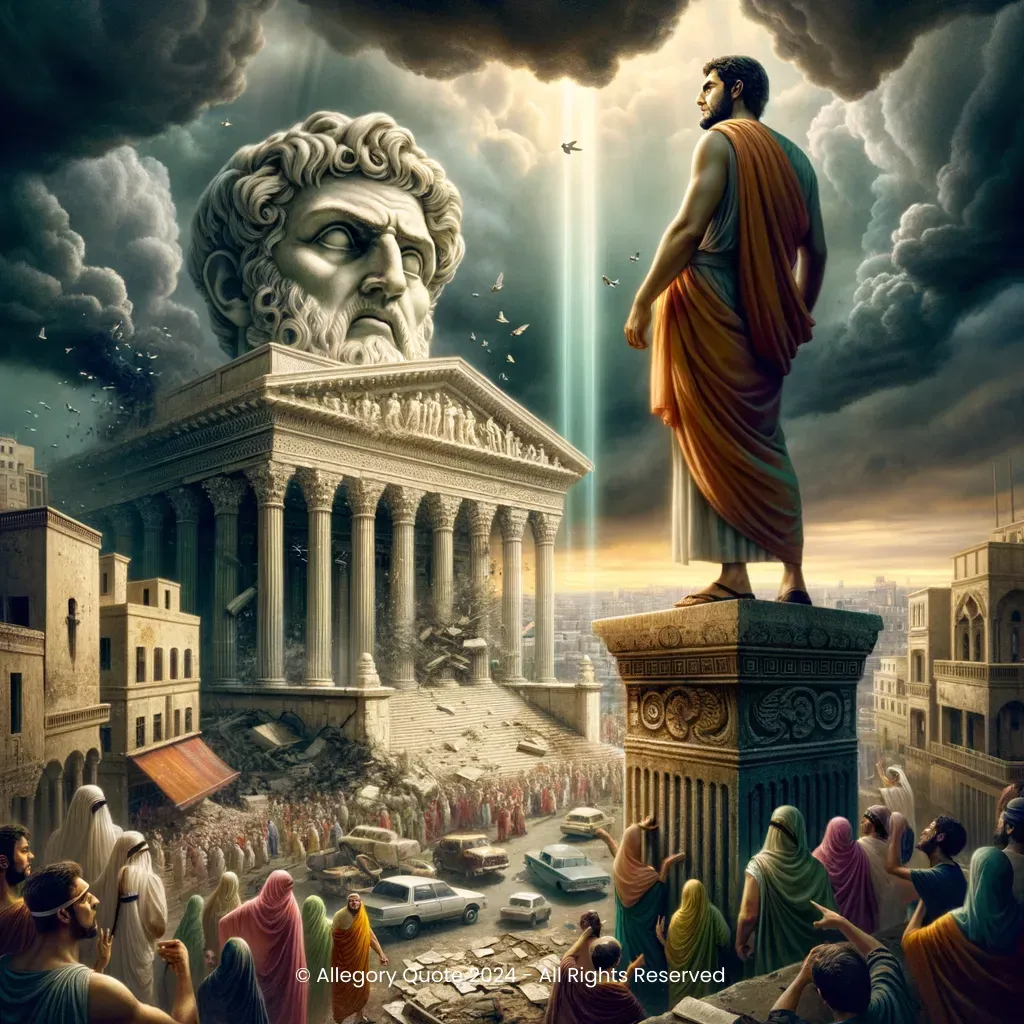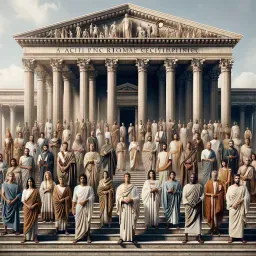O tempora, o mores!

0
0
0
0
- Meaning
- In this phrase, Cicero is lamenting the moral and ethical decline he perceives in his society. He is criticizing the prevailing corruption, decadence, and loss of traditional values in Rome. This expression has since become synonymous with disapproval of contemporary social norms and the perceived degradation of culture and morals.
- Allegory
- This image includes the following elements: - The ancient Roman orator represents Cicero, the voice of moral concern. - The high pedestal symbolizes his oratorial and ethical elevation. - The crumbling marble building signifies the decay of traditional values and virtues. - The citizens below, engaging in negative acts, illustrate the moral corruption lamented by Cicero. - The few hopeful citizens and the divided sky symbolize the ongoing struggle between degeneration and the potential for moral renewal. These elements together visually capture Cicero's lament over social decay and the enduring hope for ethical resurgence.
- Applicability
- This phrase can be applied in situations where one feels the need to critique the current state of societal values, ethical standards, or behavior. It serves as a powerful rhetorical tool to draw attention to issues of moral decay, corruption, or any perceived deviations from established traditions or ideals. It reminds individuals to reflect on their own values and behaviors and consider their impacts on society.
- Impact
- The phrase "O tempora, o mores!" has had a profound impact on Western culture, particularly in literature and rhetoric. It has been referenced by various authors, politicians, and thinkers to decry the moral and ethical failings of their times. Cicero's lament has transcended its original context, becoming a timeless expression used to critique societal norms and behaviors.
- Historical Context
- The phrase originated in Ancient Rome around 63 BC, during Cicero's consulship. The exact historical context is the political and social turmoil of the period, specifically Cicero's confrontation with the conspirator Catiline. Cicero used this phrase in his First Catilinarian Oration to underline his distress over the moral and ethical degradation he observed in Roman society.
- Criticisms
- While the phrase is a powerful critique, some may argue that it represents a nostalgic yearning for a past that may not have been as morally superior as implied. Critics might suggest that every generation perceives change as moral decline, reflecting subjective biases rather than objective truths.
- Variations
- Variations include translations into different languages and adaptations in various literary works over centuries. Some cultures might interpret the lament as a call to uphold moral integrity against modern challenges, while others might see it merely as a reflection on the inevitability of change.
-

I cannot lose the only thing that keeps me alive: hope. A word that is often with us in the morning, gets wounded throughout the day, and dies at dusk, but resurrects with the dawn.
-

Nulla dies sine linea.
-

To do a great right, do a little wrong.
-

Gaudeamus igitur.
-

To weep is to make less the depth of grief.
-

Gens togata.
-

To do a great right do a little wrong.
-

Hannibal ante portas.
-

In the middle of the journey of our life, I found myself within a dark forest, for the straight way had been lost.
-

Sic transit gloria mundi.
-

Levis est labor placidus.
No Comments